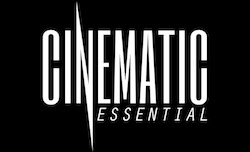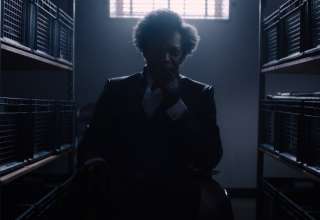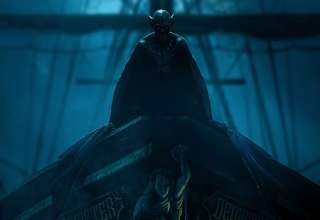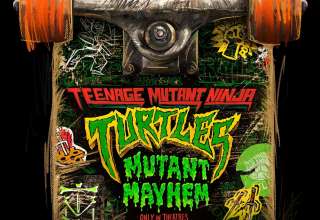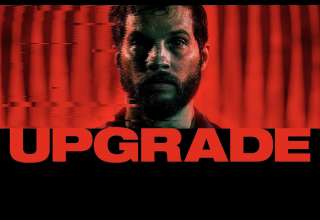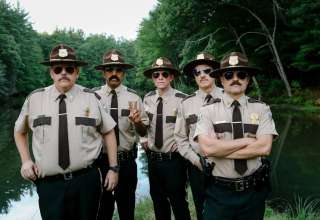A while back, I had a chance to interview Ethan Hawke get cancelled. So once another opportunity to speak with the actor/director/writer came up again, I had to take it. During our sitdown at The Coolidge Corner Theatre, he touched on subjects like filmmaking, what it takes to be successful in the arts, learning from an impressive list of directors, and how his movie Blaze came together. I found the interview to be a pretty interesting one that offered great detail into his perspective as a student of film who is always looking to absorb knowledge even after he’s gained vast amounts of experience over the years. Check it out below!
CINEMATIC ESSENTIAL: I just spoke with your wife (Ryan Hawke) before coming in here.
Ethan Hawke: Was she rude? (Laughs)
No, no, no. (Laughs) I know she’s a producer of Blaze. Seeing as it’s your first narrative feature, did having her and so many of your friends being a part of this project make it easier for you?
Well, it makes certain things easier and other things harder. There’s a level of trust and devotion. Ben (Dickey), the lead actor, is one of my best friends. The producer’s my wife. The art director is Ben’s wife. There are so many people on the movie who I have friendships with. What it allows you to do from a creative standpoint is that you don’t have to earn somebody’s trust, because you already have it. The downside is, people love this expression “labor of love.” The trouble with a labor of love is that if you fail, it’s really horrible because you put your real self on the line. It’s not a job. If I’m making Whoppers at Burger King and screw it up, I won’t really care as much. But if you’re doing what your heart lives and breathes for and your wife’s heart lives and breathes for and your best friend’s the lead and you f*ck it up? Then you’re gonna hate yourself. You think it would lower the temperature, but it actually really turns up the heat.
You mentioned Ben Dickey, who stars in the lead role. Was he the only person you had in mind when it came to casting the role of Blaze Foley?
Yeah. I never had the idea of Blaze without Ben. The idea stemmed from how much I loved Ben’s musicianship. I’ve learned through my friendship with Ben how terribly difficult the commercial environment of music is. It’s just so hard to make your way. And I started seeing a lot of parallels in Ben’s life and Blaze’s life and how if Ben could channel all of those experiences into a performance, it would be worth your money.
It was Ben who introduced you to Blaze Foley, correct?
The way I remember it is I once said to him that Clay Pigeons was my favorite John Prine song and Ben taught me that it’s not a John Prine song, but a Blaze Foley song. I was like “Who’s Blaze Foley?” He was like “Lucinda Williams wrote Drunken Angel when he was killed.” I asked how was Blaze killed, and he didn’t know. This was before the internet, so we would look it up and hear like six different stories about how he died. It’s a lot like Robert Johnson or something. There was this kind of myth around the ghost of Blaze Foley. So over the years, whenever we came across a new thing – the Outhouse tapes (Live at the Outhouse) came out on the internet – Ben sent it to me. So he was just part of our friendship and we would play one of his songs whenever we got together.
Blaze Foley was and still is a mysterious figure.
Most people don’t know who he is. I didn’t. If you’re not a lunatic, geek in the Texas outlaw country music scene, you don’t know who Blaze Foley is. If you are, people bow at the altar.
Is the fact that he’s such a mysterious figure what made you want to tell his story?
Think about it? If you go see Ray, Johnny Cash, The Doors, or any of these musical biopics, you already know the music, you’ve already heard all that music before. So, you’re watching a reheated performance of it. If you could go see a great movie about a great musician and all the music was new to you, that would be really exciting. It’s almost like a new musical or something. So, the fact that Blaze is so unknown created an opportunity for the film.
You wrote this with Sybil Rosen, Blaze Foley’s ex-wife. How did all that come about?
Well, she wrote this memoir called Living in the Woods in a Tree which is about their love affair in a treehouse. Which is so romantic to me. Living in a treehouse, learning to write songs, and she was acting in plays. It just sounded like so much fun. I think when I read her book I realized she was a very like-minded person I could work with. And I called her and told her my idea of how I wanted to steal from the book and what the movie I wanted to make would be about. She was there everyday on set. She was my left arm through the whole making of the movie. It was a wonderful experience. There’s something kind of macho about the whole cowboy Texas music scene. And seeing it through her eyes – this young Jewish woman – made him (Blaze Foley) more interesting. She could see underneath the hat, the beard, and the tough guy stance.
Do you think Blaze wanted to be a famous, well-known performer or was he purposely shying away from the spotlight?
I think it’s both. I think there’s a certain kind of artist that has an allergy to the necessary phoniness that it takes to sell yourself. On that level you can say he’s authentic. And another way, he was just extremely self-destructive, didn’t think he was worth it and was probably scared he wasn’t gonna make it so he tried to screw it up before he could fail.
You’ve lived the majority of your life as a public figure. What advice would you give to aspiring entertainers who might have to deal with the thoughts or fears that Foley may have had?
It’s hard to give advice. Everybody’s life is so unique. The overall advice is the more experience you get, the better you are. People are so scared to try. If you want to write, you gotta write. If you want to act, you gotta act. You gotta not be precious about it and not wait for the perfect thing and act whenever you can. Act in your friend’s student films, in your church basement, work on monologues by yourself, and get yourself ready. If you’re a musician you gotta practice. You gotta put yourself in position to express yourself. And until you have experience, you’re not going to be in control of it.
You’ve worked with Richard Linklater quite a bit throughout your career and he’s actually in this film. Did you ever find yourself looking to him for any sort of pointers while you were on set together?
Once you’re on set, it’s too late for pointers. It’s like sports: Once you’re in the game, it’s too late to practice your drills. You have to have done that already so that good habits are there.
I’m assuming you’ve taken things from directors like him over the course of your career.
I’ve been acting for thirty years, so I’ve watched a lot of great directors direct. Rick and I have been working on a methodology of making movies for over twenty years. I did Before Sunrise in ’95 and I’ve been learning by his behavior since then for sure. But I’ve been lucky. I ‘ve learned some things from Antoine Fuqua, from Alfonso Caurón, Sidney Lumet. And there’s no one way to make a movie. There’s no “right way.” There’s a right way for Rick and there’s a right way for me. They’re not always the same. There are certain rules that apply all the time, but you have to utilize your strengths and be aware of your weaknesses.
Is there any chance you could possibly direct yourself as a lead actor?
It’s not something I want to do. I know that sometimes it happens. A story your drawn to that you see yourself in or something like that. I don’t ever want to do that. The most fun I had directing was giving the other people a chance to excel. That’s the turn on with directing. One of the things I like about acting is serving a director’s vision. So, the idea that I would have to be serving my own vision? I don’t know. I can’t imagine that it would be an enjoyable experience.
What’s next for you? Any more directing in your future?
I don’t know. I know next up I’m going on Broadway. I’m going to do True West on Broadway with Paul Dano. That’ll be fun. I know that everything in my life stems from a love of acting, so whether I write or direct at all is all kind of connected to acting. This has been a tremendous amount of work and I’m really proud of it, but I’m definitely ready to go back to acting.
Okay, thank you.
I’m glad this interview didn’t get cancelled.
Yeah, me too.
